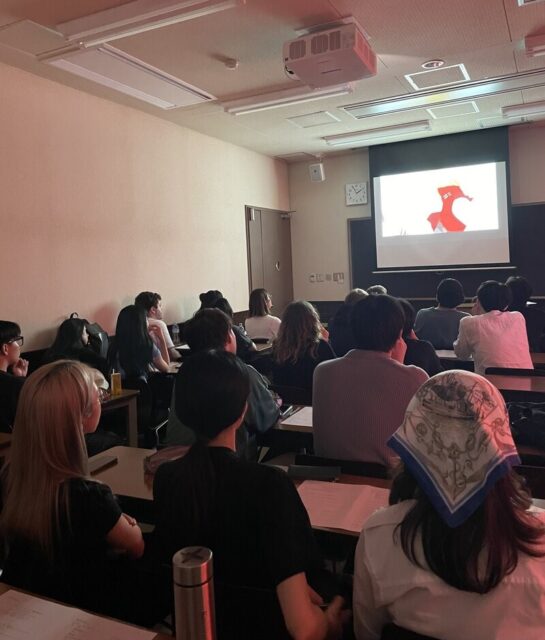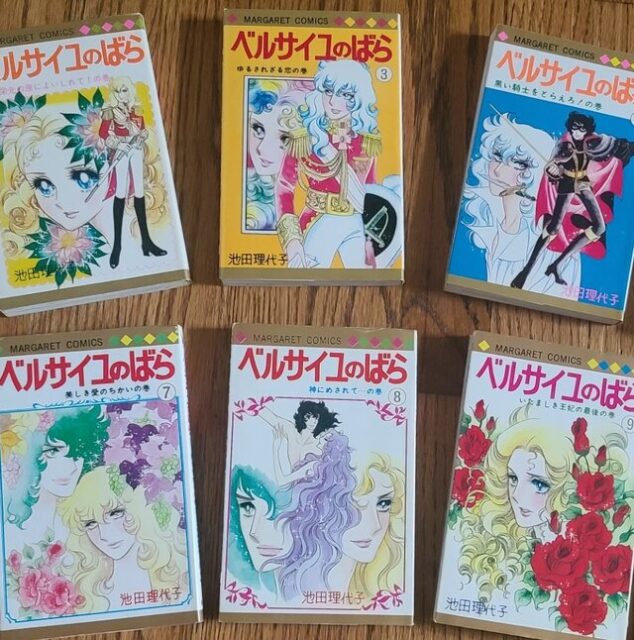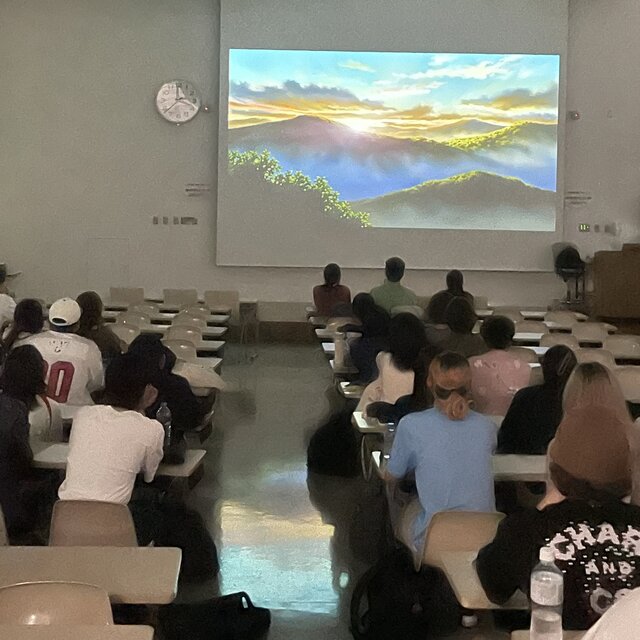日本のアニメを使った授業に参加した学生たちからのコメント
日本のアニメを使った授業に参加した学生たちのコメントをまとめました。それぞれがアニメに対する思い、日本と自国との文化の差、日本語上達のための工夫など、ユニークな考え方を共有してくれました。お楽しみください。
Bianca Gordon
出身:アメリカ日本語歴:3年好きな映画:「君の名は(Your Name)」
I have really enjoyed class so far. I love getting to converse with a different Japanese student everyday and practice my Japanese. Also, I enjoy the movie choices because they’re entertaining, and they have many widely understood themes and lessons.
In this class, I have learned a little more about how to converse better with Japanese students my age. This is the biggest difference between this class and normal Japanese class, and through this method of conversing with students over media, I get to learn more colloquial vernacular, expressions, and 相槌 that I normally wouldn’t learn how to use in a normal classroom setting.
I think the best way to improve my Japanese in this class is to try to not rely on the English subtitles. I’ve noticed that when I actively try to listen to the Japanese, I find I can understand most of the meaning, and I simultaneously learn new words in Japanese. However, this can be difficult to actively keep this up, so I sometimes find myself relying on the English subtitles which stunts my growth in the language.
When discussing the movies, I should try to speak in longer, more descriptive sentences in Japanese, rather than sticking to simple sentence structures and ideas. Even though it takes significantly more effort, challenging myself to speak in more complex sentences will help improve my ability to express my opinions in Japanese.
Koh Eunbi
出身:韓国日本語歴:5年好きなドラマ:「悪の心を読む者たち(Through the Darkness) 」(韓国ドラマ)
日本の映画やアニメーションを見て、日本語を学ぶことができるという点がとても面白かったです。 新しい単語を映像媒体と連結させて学ぶと、本で学ぶ時とは違って頭の中に長く残り、単語の意味をもう少し簡単に理解することができました。 日本人の学生たちと一緒に授業に参加するということも新しくて意味深かったです。 留学生の授業を聞いていると日本人の学生と話す機会があまりなかったのですが、この授業を通じて新しい友達を作り、日本語を使える機会が増えたようです。普通の日本語授業とは違ってこの授業は私が直接授業に参加する活動が多くて面白く授業を受けたようです。 また他の授業でもボランティア活動の日本人の学生が授業を手伝いに来て日本語で対話する場合がありますがこの授業よりは硬い感じがしました。 一方、この授業はパートナーと課題を解決しながら、授業に積極的に参加する方式なので、他の授業に比べて楽しく参加しました。 また毎週パートナーが変わり、たくさんの日本人の友達と付き合うことができるようです。
日本語の能力を向上させるためには、映画をできるだけ字幕なしで見て理解する必要があると思います。 しかし、授業の特性上、色んなレベルの学生が集まっている場合、この方法は実現しにくいと思います。 この点を解決するためには日本人学生となるパートナー活動が日本語能力向上の重要な鍵になると思います。 映画を見ながら知らない場面や内容を質問し、これに対して即刻フィードバックを受けながら日本語能力を少しずつ向上させることができると思います。 また個人的な考えでは授業内に配られるプリントの質問を解決する時間外に映画を見て理解できない部分や分からない単語をパートナーに質問する時間があったらいいと思います。 私の考えをもう一度整理する機会であり, 分からない単語や文章を理解しながら日本語の能力を向上させることができる法だと思うからです。
Zhibo Zhang
出身:中国日本語歴:2年好きな映画:鬼滅の刃
この映画クラスは、非常に魅力的で有益な経験となっています。文法や語彙、会話などの言語スキルに主に焦点を当てる通常の日本語クラスとは異なり、この映画クラスはより深い文化的な浸透を提供します。私たちは、日本映画を言語だけでなく、文化的、歴史的、社会的な文脈からも分析します。このアプローチにより、日本の社会的価値観や芸術表現を理解することができます。これまでのところ、日本のストーリーテリングの微妙な点や映画技術、そして映画が日本文化にどのように反映し影響を与えるかを学びました。この包括的な理解により、言語と文化の両方についての視野が広がりました。
このクラスの日本語レベルを向上させるためには、以下の方法が効果的だと思います。まずは日本語字幕付きの映画を見て、語彙や表現を学びましょう。 2つ目は、重要なシーンを繰り返し見て、セリフの発音やイントネーションに注意することです。ディスカッションでは、日本語で意見を述べたり、他の学生の意見を聞いたりする練習を行い、リスニング力を向上させます。たとえば、学生は映画の特定のシーンについて話し合い、そこで使用されている単語や表現を分析することで、実践的な言語スキルを身につけることができます。
Sojung Park
出身:韓国日本語歴:4ヶ月好きなドラマ:「ブラッシュアップライフ」
The biggest difference between this class and a regular Japanese class is that I can learn Japanese by communicating with Japanese people. I think it was most interesting to be paired with a different Japanese student each time and share my interests and talk about the language. Especially, Korean and Japanese have very similar grammar but use different vocabulary depending on the situation, and by communicating with the Japanese students I met in this class, I was able to use more situationally appropriate expressions. For example, it was interesting to learn that in Korea we say ‘promise’ (やく そく) when we have an appointment with someone, whereas in Japan they say ‘plan’ (よてい). It was also helpful to be able to ask them questions about words that I had wondered if they were used in real life when memorizing Japanese words. At first, I wondered if ‘サボる’, which is the root word of the English word sabotage, was actually used a lot because it felt a little unnatural, but after listening to the examples given by Japanese people, it became a word I use often. I also learned that when I first learned Japanese from a textbook, I used to use ‘ありません’ to say ‘I don’t have it.’, but in real life, it is more natural to use ‘ないです’. And I also learned that when refusing a plastic bag at a convenience store, it sounds nicer and gentler to use ‘大丈夫です’ instead of using ‘いらないです’.
In addition, I was able to learn about Japanese culture through Japanese media. In particular, while watching Summer Wars, I learned that Japan has a culture of sharing the same bath water with family. members. Although we have hot springs in Korea, we don’t share bath water at home, so it was new to me. It seems that this culture was created to save water because people take a bath frequently as the bathing culture is developed. It was interesting to learn about these different aspects of Korea even though we live in close countries.
One of the most effective ways to improve my Japanese while watching movies is to take note of common everyday terms and practice them. For example, I often watched “あたしンち” to study Japanese. I thought it would be helpful for me because it’s an anime that talks about everyday life. In particular, it talks a lot about cooking, so I was able to learn vocabulary like “ゆでる” and “こがす”. Writing down these casual vocabulary words and memorizing them consistently will help me to improve my Japanese. Furthermore, it will be very helpful to practice speaking in sentences instead of words. And it would be helpful to practice dictating as accurately as possible without looking at subtitles. I especially have a hard time distinguishing between ず and づ, so it’s important to listen to it by ear, write it down, and then go back to find the correct spelling and correct it. Also, Japanese has long sounds, so I need to pay attention to them, and it’s a very effective way to practice by listening to how long Japanese people pronounce them. Finally, I think it’s a good idea to watch Japanese media and discuss any topic with a Japanese person to find out the differences between me and them based on our own cultures. It will help me learn, understand, and gain insight into Japanese culture, not just the language.
大学卒業後、日本興業銀行(現みずほ銀行)で働いた後、世界銀行に転職。ワシントン本部で17年勤務後、世銀トルコ事務所・ベトナム事務所などに勤務。2015年定年退職。現在は東京在住。趣味は推理小説と歴史小説を読むこと。



